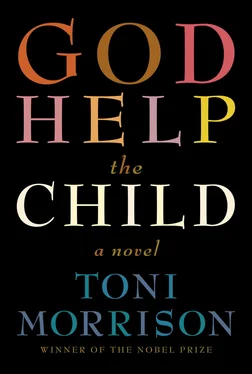I ran away, too, Bride, but I was fourteen and there was nobody but me to take care of me so I invented myself, toughened myself. I thought you did too except when it came to boyfriends. I knew right away that the last one — a conman if ever I saw one — would turn you into the scared little girl you used to be. One fight with a crazy felon and you surrendered, stupid enough to quit the best job in the world.
I started out sweeping a hairdresser’s shop then waitressing until I got the drugstore job. Long before Sylvia, Inc., I fought like the devil for each job I ever got and let nothing, nothing stop me.
But for you it’s “Wah, wah, I had to run…” Where to? In some place where there is no real stationery or even a postcard?
Bride, please.

A city girl is quickly weary of the cardboard boredom of tiny rural towns. Whatever the weather, iron-bright sunshine or piercing rain, the impression of worn boxes hiding shiftless residents seems to sap the most attentive gaze. It’s one thing for onetime hippies to live their anticapitalist ideals near the edge of a seldom-traveled country road. Evelyn and Steve had lived exciting lives of risk and purpose in their adventurous pasts. But what about regular plain folks who were born in these places and never left? Bride wasn’t feeling superior to the line of tiny, melancholy houses and mobile homes on each side of the road, just puzzled. What would make Booker choose this place? And who the hell is Q. Olive?
She had driven one hundred and seventy miles on and off dirt roads some of which must have been created originally by moccasin-shod feet and wolf packs. Truckers could navigate them but a Jaguar repaired with another model’s door had serious trouble. Bride drove carefully, peering ahead for obstacles, alive or not. By the time she saw the sign nailed to the trunk of a pine tree, her exhaustion quieted a growing alarm. Although there were no more physical disappearances, she was disturbed by the fact that she’d had no menstrual period for at least two, maybe three, months. Flat-chested and without underarm or pubic hair, pierced ears and stable weight, she tried and failed to forget what she believed was her crazed transformation back into a scared little black girl.
Whiskey, it turned out, was half a dozen or so houses on both sides of a gravel road that led to a stretch of trailers and mobile homes. Parallel to the road beyond a stretch of sorrowful-looking trees ran a deep but narrow stream. The houses had no addresses but some mobile homes had names painted on sturdy mailboxes. Under eyes suspicious of strange cars and stranger visitors, Bride cruised slowly until she saw QUEEN OLIVE printed on a mailbox in front of a pale-yellow mobile home. She parked, got out and was walking toward the door when she smelled gasoline and fire that seemed to be coming from behind the home. When she crept toward the backyard she saw a heavyset red-headed woman sprinkling gasoline on a metal bedspring, carefully noting where flames needed to be fed.
Bride hurried back to her car and waited. Two children came along, attracted, perhaps, by the fancy automobile, but distracted by the woman at the wheel. Both stared at her for what seemed like minutes in unblinking wonder. Bride ignored the dumbstruck children. She knew well what it was to walk into a room and see the exchange of looks between white strangers. The looks were dismissible because, most often, the gasps her blackness provoked were invariably followed by the envy her beauty produced. Although, with Jeri’s help, she had capitalized on her dark skin, stressing it, glamorizing it, she recalled an exchange she once had with Booker. Complaining about her mother, she told him that Sweetness hated her for her black skin.
“It’s just a color,” Booker had said. “A genetic trait — not a flaw, not a curse, not a blessing nor a sin.”
“But,” she countered, “other people think racial—”
Booker cut her off. “Scientifically there’s no such thing as race, Bride, so racism without race is a choice. Taught, of course, by those who need it, but still a choice. Folks who practice it would be nothing without it.”
His words were rational and, at the time, soothing but had little to do with day-to-day experience — like sitting in a car under the stunned gaze of little white children who couldn’t be more fascinated if they were at a museum of dinosaurs. Nevertheless, she flat out refused to be derailed from her mission simply because she was outside the comfort zone of paved streets, tight lawns surrounded by racially diverse people who might not help but would not harm her. Determined to discover what she was made of — cotton or steel — there could be no retreat, no turning back.
Half an hour passed; the children were gone and a nickel-plated sun at the top of the sky warmed the car’s interior. Taking a deep breath, Bride walked to the yellow door and knocked. When the female arsonist appeared she said, “Hello. Excuse me. I’m looking for Booker Starbern. This is the address I have for him.”
“That figures,” said the woman. “I get a lot of his mail — magazines, catalogs, stuff he writes himself.”
“Is he here?” Bride was dazzled by the woman’s earrings, golden discs the size of clamshells.
“Uh-uh.” The woman shook her head while boring into Bride’s eyes. “He’s nearby, though.”
“He is? Well how far is nearby?” Relieved that Q. Olive was not a young rival, Bride sighed and asked directions.
“You can walk it, but come on in. Booker ain’t going nowhere. He’s laid up — broke his arm. Come on in. You look like something a raccoon found and refused to eat.”
Bride swallowed. For the past three years she’d only been told how exotic, how gorgeous she was — everywhere, from almost everybody — stunning, dreamy, hot, wow! Now this old woman with woolly red hair and judging eyes had deleted an entire vocabulary of compliments in one stroke. Once again she was the ugly, too-black little girl in her mother’s house.
Queen curled her finger. “Get in here, girl. You need feeding.”
“Look, Miss Olive—”
“Just Queen, honey. And it’s Ol-li-vay. Step on in here. I don’t get much company and I know hungry when I see it.”
Well, that’s true, thought Bride. Her anxiety during the long trip had masked her stomach-yelling hunger. She obeyed Queen and was pleasantly surprised at the room’s orderliness, comfort and charm. She had wondered for a second if she was being seduced into a witch’s den. Obviously Queen sewed, knitted, crocheted and made lace. Curtains, slipcovers, cushions, embroidered napkins were elegantly handmade. A quilt on the headboard of an empty bed, whose springs were apparently cooling outside, was pieced in soft colors and, like everything else, cleverly mismatched. Small antiques such as picture frames and side tables were oddly placed. One whole wall was covered with photographs of children. A pot simmered on the two-burner stove. Queen, unaccustomed to being rebuffed, placed two porcelain bowls on linen mats along with matching napkins and silver soup spoons with filigreed handles.
Bride sat down at a narrow table on a chair with a decorative seat cushion and watched Queen ladle thick soup into their bowls. Pieces of chicken floated among peas, potatoes, corn kernels, tomato, celery, green peppers, spinach and a scattering of pasta shells. Bride couldn’t identify the strong seasonings — curry? Cardamom? Garlic? Cayenne? Black pepper and red? But the result was manna. Queen added a basket of warm flat bread, joined her guest and blessed the food. Neither spoke for long minutes of eating. Finally, Bride looked up from her bowl, wiped her lips, sighed and asked her hostess, “Why were you burning your bedsprings? I saw you back there.”
Читать дальше












